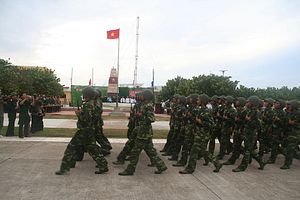The general secretary of the Communist Party of Vietnam (CPV), Nguyen Phu Trong, is in Beijing this week for meetings with Chinese leaders. Trong’s visit continues the trend of warming China-Vietnam ties through direct party-to-party relations rather than state mechanisms, a point Carl Thayer noted in an earlier piece for The Diplomat.
Trong is in China at the invitation of his counterpart, Chinese Communist Party General Secretary Xi Jinping (who, of course, is also China’s president). China and Vietnam are celebrating the 65th anniversary of the establishment of diplomatic ties this year and both the VCP and CCP are eager to move past last year’s ugly dispute over a Chinese oil rig operating off the Paracel Islands.
Xinhua interpreted Trong’s trip as a signal that both sides “cherish their strong and lasting bond,” which is based on “geographical proximity, economic complementarity, cultural affinity and ideological similarity.” Xinhua added that it is “naïve” to think that China and Vietnam’s “deep-rooted partnership would eventually crumble because of the South China Sea row.” Neither country “will allow anybody to drive a wedge between them,” the piece continued, referencing speculation that Vietnam is moving closer to the U.S.
In a press conference, Chinese Foreign Ministry spokesperson Hua Chunying said that China places great importance on Trong’s visit. She also emphasized China’s commitment to “developing a future-oriented relationship [with Vietnam] featuring long-term stability, good-neighborliness and all-round cooperation, and the spirit of staying as good neighbors, friends, comrades and partners.”
To do that, the two countries will have to overcome suspicion and mistrust stemming from maritime disputes in the South China Sea. In his meeting with Trong, Xi urged China and Vietnam to “seek common ground while shelving differences, and control their disputes to ensure that the bilateral relationship will develop in a right track.” He also suggested that the VCP and CCP, as well as the two governments, should “boost high-level interactions to find out new solutions to their problems.” Trong and Xi agreed to work to control their maritime disputes and pledged closer cooperation on defense, security, and law enforcement.
The Nikkei Asian Review said that Trong and Xi had also agreed to work together on the Maritime Silk Road (MSR), China’s vision for a trade route stretching from its east coast to the Middle East and Europe via the Indian Ocean. Vietnam would be a crucial link in the MSR thanks to its geographic location, but has so far resisted committing to the project due to maritime tensions with China. Nikkei reports that “Xi and Trong focused on economic cooperation for the planned trade corridor at a meeting Tuesday in Beijing,” coming to an agreement to set up task forces to explore cooperation on infrastructure projects and financial exchanges.
According to Xinhua, however, Trong merely said Vietnam was considering joining the MSR.
Despite an emphasis on its relationship with Beijing, Vietnam made certain no one could accuse it of tilting too far toward China. Even while Trong was in Beijing, Vietnam was simultaneously hosting U.S. Navy ships in Da Nang for annual joint naval activities. Hanoi also welcomed Russian Prime Minister Dmitry Medvedev for a three-day visit. Trong himself will be visiting Washington, D.C. later this year.

































